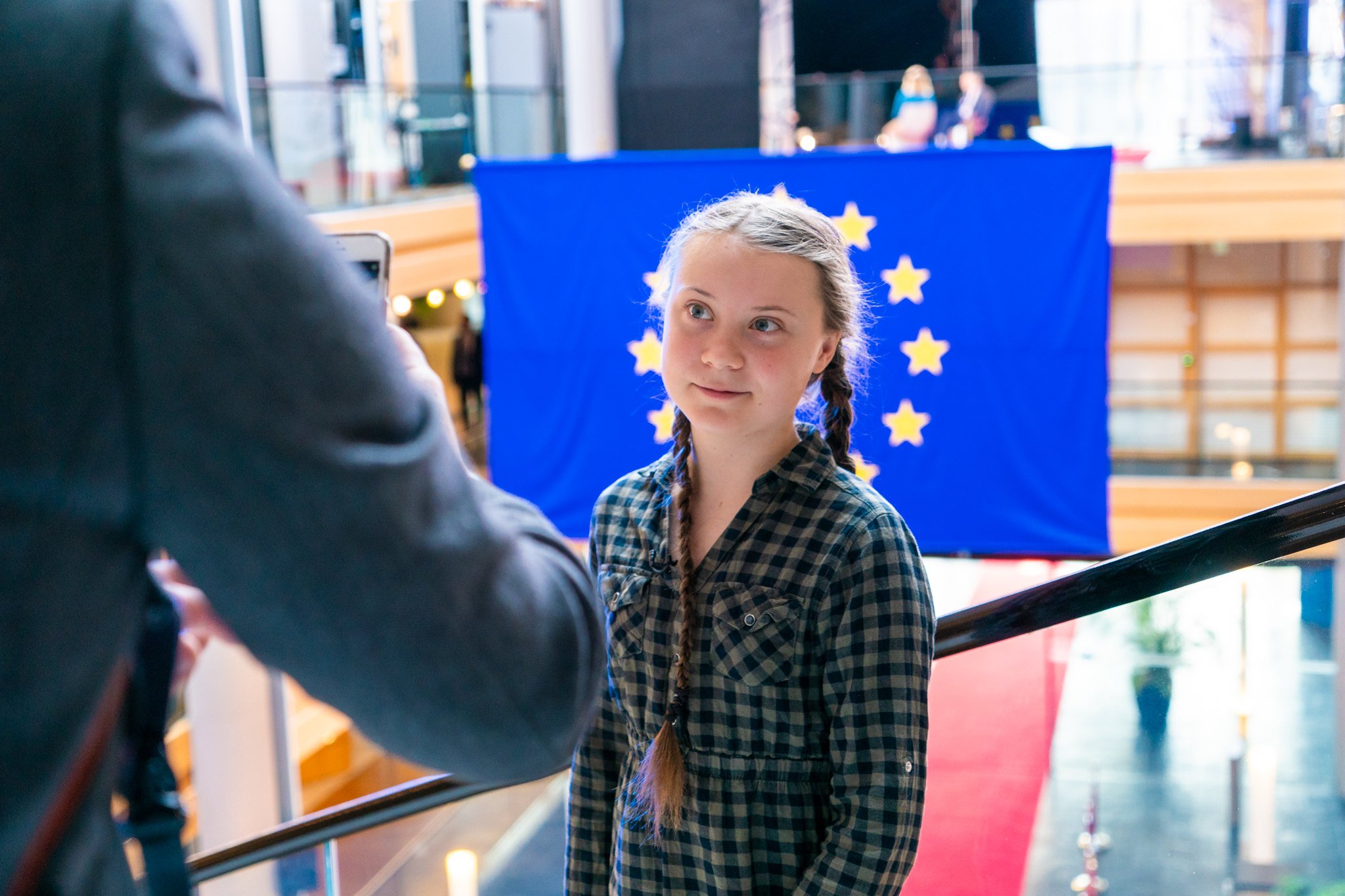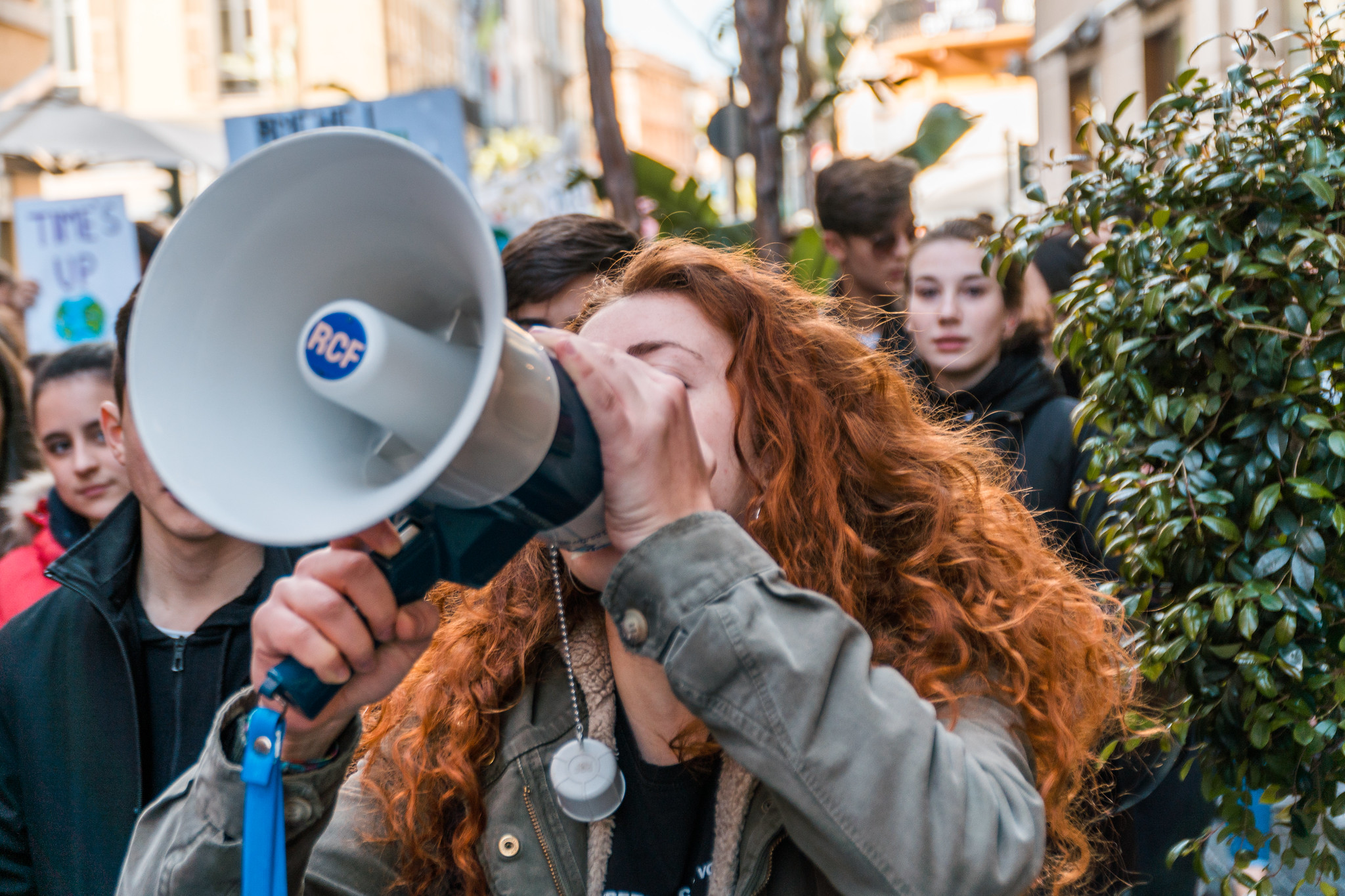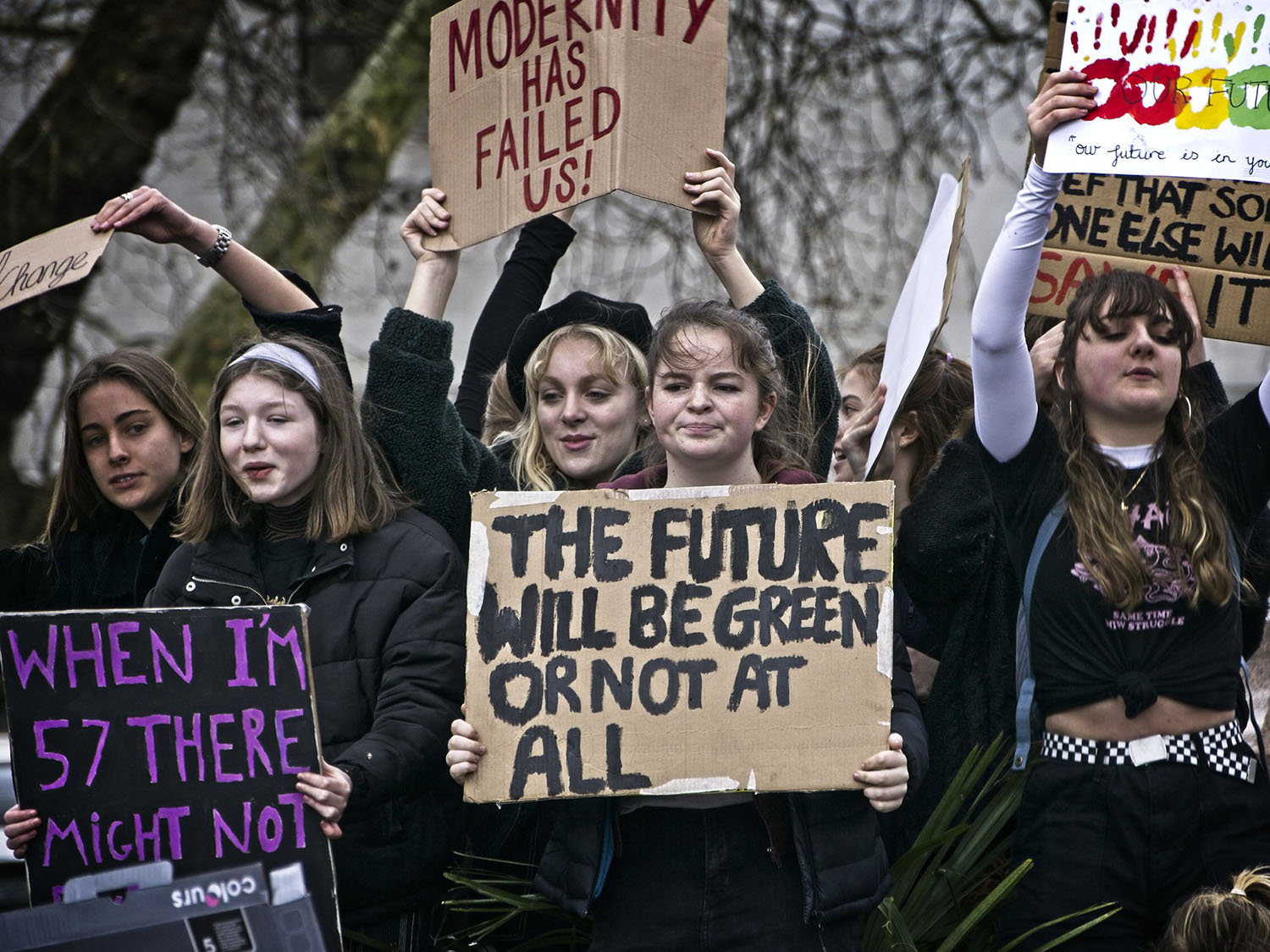Girls are taught to obey.
It starts early with the admonition to be nice, be sweet, do not upset, insult or talk back. Above all be law-abiding and do as you’re told.
But real change comes when girls don’t do as they’re told.
When Swedish environmental teen activist Greta Thunberg addressed the World Summit in Vienna this week, she stated the brutal truth about our climate emergency in clear and precise language.
The school strikes for climate change that Thunberg precipitated are only one of the many civil disobedience campaigns that young women are leading around the world.

From the right to control your own body to the necessity of saving the planet, direct action makes a difference, but it also requires considerable courage. Nothing makes this more explicit than a tiny little girl standing up to family, community and centuries of tradition and saying no.
Giselle Portenier’s documentary In The Name Of Your Daughter documents the women and men working to end the practice of female genital mutilation (FGM) in rural Tanzania. While adults are helping, it is often girls, some as young as six years of age, who are refusing to submit.
The film is screening at the Vancity Theatre on Sunday, June 2 as part of the Women Deliver Conference (June 3 to 6) in Vancouver. The screening and a panel discussion are part of a special pre-conference program focusing on FGM, with experts and activists from 35 different counties. Director Portenier is also speaking on the Women Deliver Power Stage on Wednesday, June 5.
Women Deliver is the largest conference in the world that focuses on gender equality and the health, rights and well being of girls and women. Held every three years in different cities around the globe, the 2019 Conference will host 6,000 delegates, panelists and invited speakers, all addressing issues that directly impact women. Prime Minister Justin Trudeau, Sophie Grégoire Trudeau, Tarana Burke and Melinda Gates are among the most high-profile speakers, but the list of attendees is remarkable. Everyone from the UN’s Deputy Commissioner for Human Rights to the president of Ethiopia will be in attendance.
From this massive conference to a remote village in Tanzania might seem a bit of a jump, but if the universality of women’s suffering is everywhere, so is female courage.
‘Cutting season’
In remote rural communities in Tanzania, the cutting season (when girls are subjected to FGM) begins with the start of school holidays. This is also when activist Rhobi Samwelly (the Founder and Director of Hope for Girls) launches her education campaign in local schools, explaining not only the practice itself, but making clear to students that they have the right to refuse.
In Tanzania, although female genital mutilation is illegal and punishable by jail time, the practice has continued. In many remote villages, FGM takes place under cover of darkness. Performed with rudimentary instruments, in the middle of the bush, the results are horrific injury and often death. Young girls and even newborn infants are cut. Many die from blood loss or infection.
Rosie Makore (age 12) is one of the girls in the film who is faced with an unbearable decision — undergo being cut or risk losing her entire family and community. Rosie, along with a group of girls and young women, finds safety with Samwelly, who operates a safe house that offers girls a place of refuge. The film depicts the reality of the situation with blunt honesty, talking to families as well as police, educators and activists. But it still often comes down to the girls themselves demanding change.
The practice of FGM may be a longstanding cultural tradition, but its real purpose is often economic. After a girl is cut, the ceremony is often followed by child marriage. As one of the girls living in the safe house notes of her young friend, “Neema doesn’t even have breasts yet, how will she feed the baby?” Girls who have been cut fetch a better bride price (15 to 20 cows as opposed to fewer than six cows for a girl who hasn’t been mutilated). In a speech to villagers, Samwelly says, “When you look at your daughters, all you see are cows.”
The most personal battles are often the hardest and the most painful. As little girls talk about leaving their families, the pressure of their decisions is evident. It is a raw, agonizing choice. Choosing to save yourself is a radical act of defiance. In this, the young women and girls in Tanzania have a lot in common with women in North America who are gearing up for their own acts of disobedience.
The fight for choice
The recent criminalization of women who seek abortion care in a growing number of U.S. states has resurrected the idea of a new underground railway, not entirely unlike the safe houses in Tanzania. Canadian women are offering room, board and support to American women unable to access reproductive services in the U.S. Maclean’s columnist Tabatha Southey wrote about the Canadian cousin phenomena recently.
This idea is only the most recent example of women undertaking acts of civil disobedience to help other women. There is a long history of these campaigns — from the suffragettes to the Jane Collective. In the case of FGM, women have the law on their side, but for many other issues that isn’t the case. As many longtime organizers have noted, no victory is permanent, and some must be fought over and over again.
Female bodies have long been a battleground, but the struggle over the most fundamental of human rights, the power to control your own body, has reached strange new territory. The hypocrisy of a pro-life movement that supports the death penalty for women who have abortions could make your head explode.
It was hard not to watch Portenier’s film and think about the current situation in the U.S., as abortion bans march across different states — Georgia, Mississippi and Alabama. Even as legislators maintain that the bans are about the sanctity of life, the economic ramifications are clear. Taxes, voting rights, money and power are all at play. As a number of different journalists have indicated, the states with abortion bans rank among the highest in the U.S. for maternal mortality rates and child poverty. Money isn’t being spent on making life easier for mothers and children, and if sanctity of life isn’t really the issue, what is exactly?
Controlling women is one aspect, but another may be much simpler. Plain old money.
It circles back to something that Greta Thunberg said in her speech in Vienna: “You have stolen our future and sold it for profit.” A similar statement also occurs in Portenier’s film, where a young girl named Rosie demands the right to a better future and not be sold into an early marriage.
It may seem kind of reductionist, but at the heart of every confounding decision — whether it’s mutilating a newborn baby girl or building pipelines, money plays a significant role.
But here is where active disobedience resurfaces in profound fashion, moving from the micro (body) to the macro (planet) in a couple of startling leaps. Change of a certain magnitude requires a seismic shift on multiple levels — familial to political. You can see it in the personal revolution required for young girls to demand control over their own bodies, to remain whole, safe and free. You can see it in young activists like Thunberg, or students participating in climate strikes or Extinction Rebellion events, demanding that world leaders act to safeguard the future of the earth. Not for the sake of green jobs or economic benefits, but because it is the right thing to do.
It’s an issue that George Monbiot has raised a number of times in his Guardian column, mostly with an article that stated that only widespread acts of personal rebellion could forestall total global collapse. As Monbiot writes: “Those who govern the nation and shape public discourse cannot be trusted with the preservation of life on Earth. There is no benign authority preserving us from harm. No one is coming to save us. None of us can justifiably avoid the call to come together to save ourselves.”
Thunberg makes clear in her address that the current state of the world necessitates radical and immediate action. That these demands come from the very young does not make them any less meaningful, but the other way around.
Although children are not leaders, increasingly they are the ones forced to lead as the adults seem incapable of actually taking the kind of action that is necessary to avoid world-ending catastrophes. As Thunberg states, world leaders must stop playing with words and numbers: “Winning slowly is the same as losing when it comes to the climate crisis.” The audience of politicians, celebrities and media types listening to her speech look shamefaced and mortified, and deservedly so, as the true scope of the threat becomes clearer every day.

Beyond conferences and summits
All the summits, forums or massive conferences, while useful, don’t necessarily address the central issue, which is that of expediency. At worst, they simply forestall the issue, making everyone feel good but actually changing very little.
The theme of this year’s Women Deliver Conference is how power can “drive — or hinder — progress and change.” Gender equality, structural change, empowerment and genuine (sustainable) progress are all on the table for active discussion. This all sounds great, but I cannot help but feel that for all the conversations happening around women’s issues that things have gone backwards in many parts of the world.
Mass movements are good and necessary, but as Andrew Nikiforuk wrote recently in The Tyee, they’re apt to turn into self-serving organizations: “environmentalists, now a largely well-funded urban class, have been busy recording the losses, mapping the disturbances, and charting the colonization of complex natural communities with human monocultures.”
It’s hard to look at a large (well-funded) conference like Women Deliver, with its stable of corporate sponsors like Johnson & Johnson or Pfizer, companies with little interest in seriously disrupting the status quo, and think that it will have any real impact.
More apt to change things is Feminists Deliver, a self-described “grassroots collaboration of British Columbia-based self-identified women, girls, non-binary and two-spirit people and the organizations that support them that have come together.” The Conference and Trade Show parallels the Women Deliver event, but takes a decidedly more intersectional and inclusive approach.
It’s always the unruly radical edge that forces change — from the suffragettes to the Stonewall Riots to #MeToo. Often it’s the very young standing up and yelling no. Greta Thunberg and many young women like her have demonstrated what one small body and mind can do. Women acting collectively in open and angry defiance can change history, whether it’s the women of Greenham Common, or the Second Wave feminists.
Radical change is needed. Right now.
In the New York Times, writer Mona Eltahawy quotes historian Howard Zinn on the necessity for drastic action: “The greatest danger… was civil obedience, the submission of individual conscience to governmental authority.”
As Eltahawy argues, we are actually afraid of the wrong things. The greater threat comes not from change, but from stasis, of allowing business as usual to continue.
An added benefit is getting to flout the dictates of Doug Ford, Andrew Scheer, Jason Kenney or Donald Trump. And in truth, nothing thrills me more than defiance. The simple act of saying no. No to coal mines. No to FGM. No to pipelines. No to abortion bans. No to guns and the NRA. No to clearcutting, fracking, fish farms. No to transphobia, racism, sexism, hatred, fear and cowardice.
A radical shift demands that we face not only our own fears, but more slippery things like laziness, complicity and rationalization, the things that we tell ourselves in order to keep things way that we’ve always known them to be. But this state won’t be allowed to continue for too much longer. In Thunberg’s words, the world requires “a new way of thinking.”
If a six-year-old girl can defy family, culture, tradition and demand a new way of being, then surely we can too.
I aim to disobey. ![]()
Read more: Gender + Sexuality
















Tyee Commenting Guidelines
Comments that violate guidelines risk being deleted, and violations may result in a temporary or permanent user ban. Maintain the spirit of good conversation to stay in the discussion.
*Please note The Tyee is not a forum for spreading misinformation about COVID-19, denying its existence or minimizing its risk to public health.
Do:
Do not: